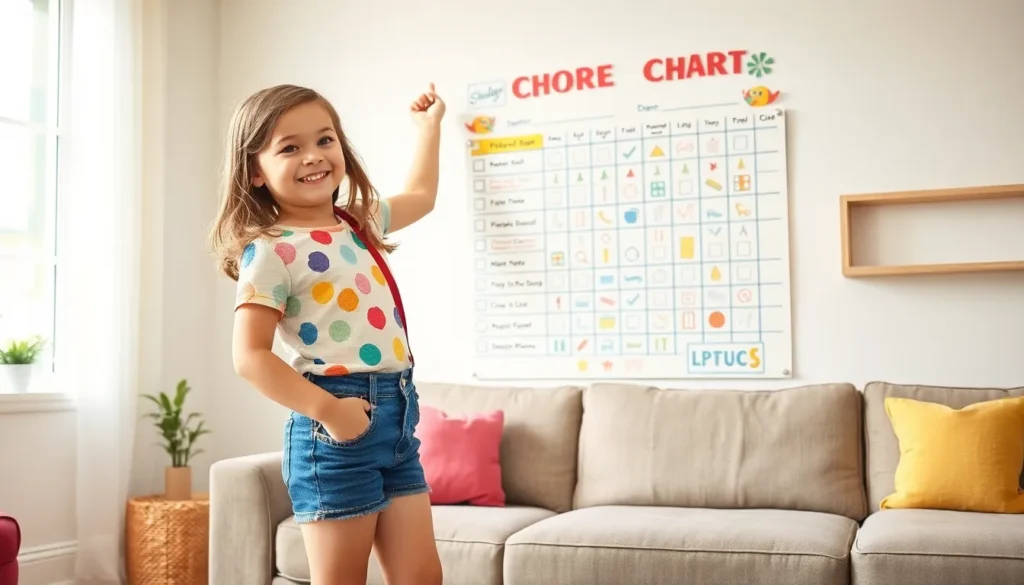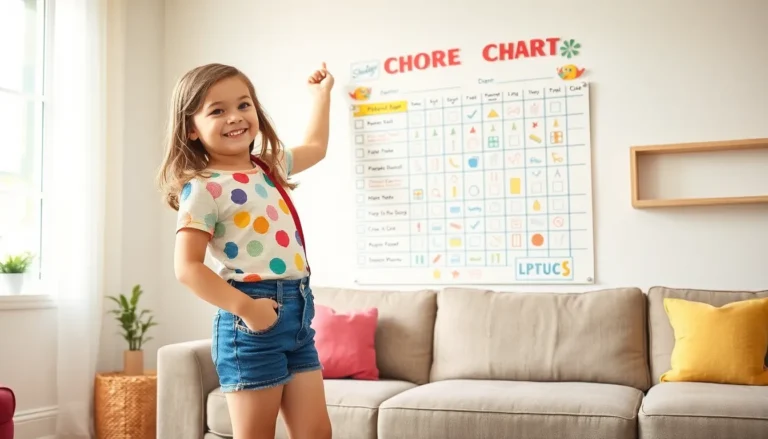Table of Contents
ToggleEvery parent knows that keeping a toddler entertained can feel like trying to herd cats. But what if there was a magical solution that could turn chaos into calm? Enter music for toddlers—a delightful blend of catchy tunes and playful rhythms that not only captivates little ears but also nurtures their developing minds.
Benefits of Music for Toddlers
Music plays a vital role in early childhood development. It enhances learning experiences while providing joy and stimulation.
Cognitive Development
Engaging with music positively impacts cognitive development. Studies show that music exposure improves language skills and enhances memory retention in toddlers. Rhythmic patterns and musical structure help children better understand sequencing and patterns. Singing along to familiar tunes strengthens vocabulary and encourages language acquisition. Participation in music activities stimulates brain function, leading to improved problem-solving abilities. Thus, integrating music into daily routines can significantly boost cognitive abilities in young children.
Emotional Growth
Music also fosters emotional growth in toddlers. Listening to melodies promotes relaxation and comfort, often alleviating anxiety. Expressing feelings through singing or dancing encourages emotional awareness and regulation. Collaborative music-making can enhance social skills by encouraging teamwork and sharing. Through music, children learn to recognize and express emotions, leading to improved mental well-being. This emotional connection to music supports resilience, empowering toddlers to navigate their feelings.
Types of Music for Toddlers

Music for toddlers comes in various forms that cater to different needs and preferences. Two prominent types stand out: lullabies and soothing music, as well as interactive music.
Lullabies and Soothing Music
Lullabies serve as a calming tool for young children. Soft melodies promote relaxation and help toddlers transition into sleep. Familiar tunes often ease anxiety and create a sense of security. Examples include classic lullabies like “Twinkle, Twinkle, Little Star” and “Hush, Little Baby.” These songs not only soothe but also support bonding between parent and child during bedtime routines. Playlists filled with gentle, melodic tracks enhance these moments and establish a comforting atmosphere, benefiting children’s emotional well-being.
Interactive Music
Interactive music engages toddlers in playful learning experiences. Songs that involve actions, such as “If You’re Happy and You Know It,” encourage participation and movement. These activities enhance motor skills and foster social interactions among peers. Parents can promote engagement through musical games and simple instruments like maracas or tambourines. Exposure to diverse genres, from nursery rhymes to upbeat children’s songs, can stimulate curiosity and creativity. This interaction not only develops early language skills but also nurtures a joyful environment, making learning fun and memorable for young children.
Recommended Music Genres
Selecting the right music genres enhances the listening experience for toddlers. Various styles contribute to cognitive and emotional development, making music an essential resource for early childhood.
Classical Music
Classical music plays a significant role in creating a soothing environment. It often features gentle melodies and harmonious arrangements that promote relaxation. Studies indicate that exposure to classical music can improve toddlers’ spatial-temporal skills. Notable composers such as Mozart and Beethoven offer compelling pieces that captivate young listeners. Parents often find that playing classical music during nap times aids in better sleep patterns. This genre sparks curiosity and introduces children to different instruments and styles, enhancing auditory senses.
Nursery Rhymes
Nursery rhymes serve as foundational elements in early childhood music education. Catchy tunes and repetitive structures make them easy for toddlers to remember. These songs often incorporate simple stories, encouraging language development and literacy skills. Common rhymes like “Twinkle, Twinkle, Little Star” or “The Wheels on the Bus” provide interactive learning opportunities. Engaging in finger plays and motions while singing promotes motor skill development. Families frequently enjoy the shared experience of singing nursery rhymes together, fostering emotional bonds and social interactions.
Effective Ways to Introduce Music
Introducing music into a toddler’s life enriches their early experiences. Engaging with music can enhance cognitive and emotional growth.
Creating a Musical Environment
Establishing a musical environment fosters exposure to various sounds. Play different genres throughout the day to stimulate curiosity. Soft classical music during quiet times promotes relaxation. Additionally, upbeat songs in play areas energize and motivate young children. Incorporate music in daily routines, such as during bath time or while preparing meals. They associate familiar tunes with positive emotions, encouraging a love for music. Regularly rotating playlists can maintain interest, ensuring younger audiences remain engaged.
Engaging in Sing-Alongs
Participating in sing-alongs promotes language development and social skills. Singing together fosters bonding and creates joyful memories. Incorporate popular nursery rhymes to encourage cognitive connections. Use simple melodies that toddlers can learn quickly, allowing them to join in effortlessly. Actively use gestures and movements during songs; toddlers love mimicking actions. Encourage them to choose favorite songs, empowering their musical preferences. Engaging in group sing-alongs also nurtures social interactions, making music a communal experience.
Music offers a delightful and effective way to enrich a toddler’s early experiences. By incorporating various musical genres into daily routines parents can foster cognitive and emotional development in their children. The benefits of music extend beyond entertainment; it enhances language skills and encourages social interactions.
From soothing lullabies that aid in sleep to interactive songs that promote playful learning music creates a nurturing environment for toddlers. Embracing music not only cultivates a love for sound but also strengthens the bond between parent and child. By making music a part of everyday life families can enjoy the joyful journey of growth and discovery together.







